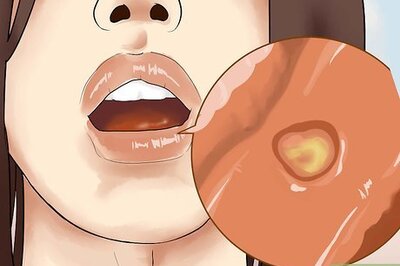
views
Sex may permeate our popular culture, but conversations about it are still associated with stigma and shame in Indian households. As a result, most individuals dealing with sexual health issues or trying to find information about sex often resort to unverified online sources or follow the unscientific advice of their friends.
To address the widespread misinformation about sex, News18.com is running this weekly sex column, titled ‘Let’s Talk Sex’, every Friday. We hope to initiate conversations about sex through this column and address sexual health issues with scientific insight and nuance.
The column is being written by Sexologist Prof (Dr) Saransh Jain. In today’s column, Dr Jain tells you everything you need to know about Dyspareunia, or painful intercourse.
Painful sex is distressing and can result in loss of sexual interest and affect relationships. Dyspareunia is the term used to describe the pain before, during or after vaginal intercourse. There are many causes of dyspareunia including physical, like not enough lubrication, a skin infection, illness or surgery. Psychological causes like partner issues, stress and anxiety can also contribute to dyspareunia.
Pain during sex is more common in women. However, it can affect both men (male dyspareunia) and women (female dyspareunia) of all ages.
Are There Different Types of Dyspareunia?
There are mainly two types of dyspareunia, which are classified according to the pain areas.
• Entry pain (superficial dyspareunia): This pain is felt at the entrance of the vagina during initial penetration. Some factors associated with entry pain can be lack of lubrication, injury or infection.
• Deep pain (collision dyspareunia): This pain occurs during deep penetration and can get worse under certain sexual positions. You will feel this pain in the cervix or lower abdomen. A medical condition or prior surgery usually causes such pain.
What Causes Dyspareunia?
In many cases, you can experience pain during sex if there is not sufficient vaginal lubrication. In these cases, the pain can subside if you become more relaxed, increase foreplay or use a lubricant.
Pain in the vagina can be caused by:
• Infection – thrush or a sexually transmitted infection (STI), such as chlamydia, gonorrhoea or genital herpes
• Menopause – changing hormone levels can make your vagina dry
• Lack of sexual arousal at any age
• Vaginismus – a condition where muscles in or around the vagina shut tightly, making sex painful or impossible • Genital irritation or allergy caused by spermicides, latex condoms or products such as soap and shampoo
Some causes of painful sex in men are:
• Infections like thrush, which can cause soreness and itching, and some STIs such as herpes
• A tight foreskin, which can make penetration painful, as the foreskin is pushed back
• Small tears in the foreskin that can’t be seen but cause soreness and a sharp, stinging pain around the tear
• Inflammation of the prostate gland
• Testicle pain and swelling, which can sometimes be caused by getting sexually aroused but not ejaculating
What does Dyspareunia Feel Like?
The most common symptom is pain during intercourse that occurs at the vaginal opening or deep in the pelvis. It can be a distinct pain in one area or it may affect the entire genital region. There can be a sense of discomfort, burning or throbbing. If you have pain during sex, you may feel:
• Throbbing or aching after intercourse
• Sharp pain during penetration or at entry
• Deep pain during thrusting
• Burning pain
• Pelvic cramping
• Muscle tightness or spasms
How can Dyspareunia be Treated?
A doctor will diagnose dyspareunia after seeking a brief medical history from the patient and carrying out a pelvic examination. Further tests such as a pelvic ultrasound, urine culture and allergy test may be required.
Dyspareunia treatment will depend on the cause. Physical causes are typically treated with medical intervention. Antibiotics and antifungal medication may be prescribed to treat infections while topical creams and lubricants may be used to check vaginal dryness. Psychological causes may require counselling or sex therapy to revive communication and intimacy in the relationship. Kegel exercises may be recommended to improve control of the vaginal muscles.
Ways to Treat Dyspareunia at Home
If you suffer from dyspareunia, you can follow these simple steps at home. These are best taken before having sex.
• Use a water or silicone-based lubricant to help with vaginal dryness
• Try sexual activities or positions that do not cause pain
• Find time to relax and de-stress before having sex
• Apply ice packs to the vulva after sexual intercourse
The recovery time for dyspareunia varies depending on the underlying cause for the pain. But the good news is that you can find relief, whether through medication, counselling, surgery or using lubrication.
If you are experiencing pain during sex, contact your healthcare provider. Do not feel embarrassed to discuss your symptoms. Treating the problem can help your sex life, bring intimacy back in the relationship and give you more confidence.
Read all the Latest Lifestyle News here


















Comments
0 comment